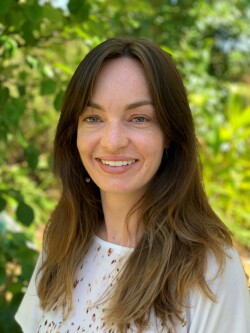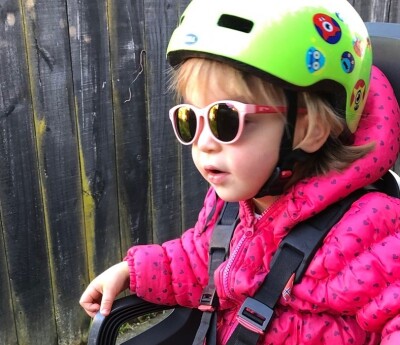We caught up with Senior Sustainability Specialist Nicky Andrews to talk about materiality assessments, carbon footprinting, corporate responsibility and bike riding.
How did you get started in corporate and environmental responsibility work?
 I worked at National Australia Bank (NAB) and they had a two week ‘Earth Watch’ trip in the Daintree Rainforest in northern Australia. I was one of 20 chosen and on that trip I realised, ‘Wow, my job could be improving the environment – these jobs exist’. It was run by the corporate responsibility team at NAB and I learnt what their job involved. I then moved into reporting on the environmental and social performance of the bank.
I worked at National Australia Bank (NAB) and they had a two week ‘Earth Watch’ trip in the Daintree Rainforest in northern Australia. I was one of 20 chosen and on that trip I realised, ‘Wow, my job could be improving the environment – these jobs exist’. It was run by the corporate responsibility team at NAB and I learnt what their job involved. I then moved into reporting on the environmental and social performance of the bank.
I later taught corporate responsibility at a French university in 2019/20, which was very cool. But I didn’t have any formal training in the area. When I returned to New Zealand, I decided to do a Master of Environmental Management. It’s been great learning more and there's so many things happening – new topics, theories, policies.
What have your studies involved?
I've always preferred being a generalist. I studied a range of topics like the circular economy, lifecycle assessments and climate change science and policy. My research thesis is on the drivers for large New Zealand businesses to adopt decarbonisation strategies. How much does the government impact businesses with policies like the Emission Trading Scheme? Are they being pushed by new climate-related disclosures, or is it more an internal drive, or pressure from supply chains or shareholders?
What kind of client work do you do at thinkstep-anz?
I measure carbon footprints for businesses. With a healthcare provider we're currently looking at their footprint, then developing an emission reduction plan and setting a science-based target. It’s good to work with clients to measure, set targets and identify what actions will help them achieve it.
You also do materiality assessments – why are they important for a business?
Materiality is about understanding what's important to your stakeholders, both internal and external. That matters because these are the people who will have an impact on your business. Whether that’s the shareholders who choose to invest, or your customers. It's important to understand what they expect of you, rather than just making those calls yourself. Find out what your stakeholders want by asking them!
It’s a way to prioritise how you set targets and work to improve. Knowing what stakeholder groups value also lets you report on what is valuable to them. If you know climate change is important to your stakeholders and you’re addressing it, you can show that in your reports.

Nicky and her family
How do you overcome tricky problems at work?
There's so much to know. No one is an expert in everything, but someone in thinkstep-anz probably is in any given area. It’s great to get their insights. I've been trying to understand science-based targets and the New Zealand government’s plans for embodied carbon emissions in buildings. We have colleagues who are experts (like Technical Director Jeff Vickers). It's good to talk with them and learn, but again, I don’t need all the answers: the team collectively knows it.
Is there an interesting sustainability area you’re seeing develop?
I really like the Task Force on Climate-related Financial Disclosures (TCFD) that New Zealand is making mandatory for large businesses. It brings climate-related issues to the core of business. It’s no longer a ‘nice to have’; it's an integral part of strategy. They should be treating these non-financial disclosures with the same integrity as financial disclosures. People might discount it as a long-term problem, but the longer it takes to respond, the more expensive it will be.
How did you start working at thinkstep-anz?
For lifecycle assessment work at uni, Florian Nebel gave us licenses to use LCA software which is when I first learnt of thinkstep-anz. I wanted to work in this area, maybe part-time with study. The thinkstep-anz website shows the many different services we cover and there were opportunities to develop in different areas. There are also open job applications. I wrote a letter outlining my skills… and then had an interview that week.
What's the most sustainable and unsustainable thing you've done lately?
I live in Auckland, but my parents live in Christchurch. My husband, daughter and I fly there reasonably often so we can spend time with them. That’s a hard one to avoid. My husband's French, and once every couple of years we fly across the world. We do pay to have those emissions offset. I’m also hopeful airlines develop sustainable aviation fuel. I also like taking long showers – all my good environmental intentions go out the window.
I'm always trying to add small, manageable steps for a more sustainable life. We have a Bokashi bin and I buy clothes second-hand. I’ve bought an electric bike so I can bike to work and cycle my daughter to childcare. I try to get around mostly on the bike, though it's not always easy in Auckland's weather.

Ready to roll
What are you passionate about outside of work?
I like spending time with my family and enjoy watching my two-year-old grow up. I’m fascinated by the things she learns every day. It's probably my passion right now. It’s great to go on bike rides with her too. I have recently got back into reading as well. With university it’s hard to read for pleasure. Study has been good but I'm looking forward to it being done. We’ll be able to go on more weekends away.